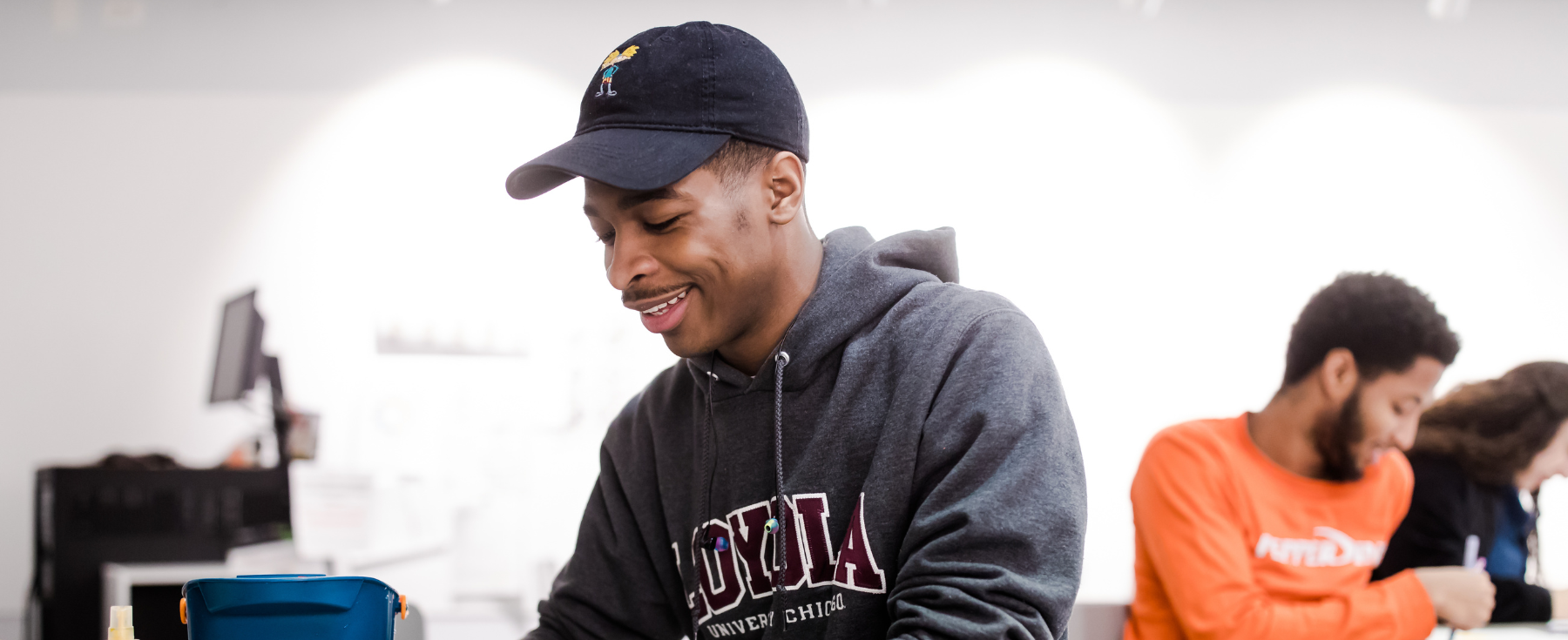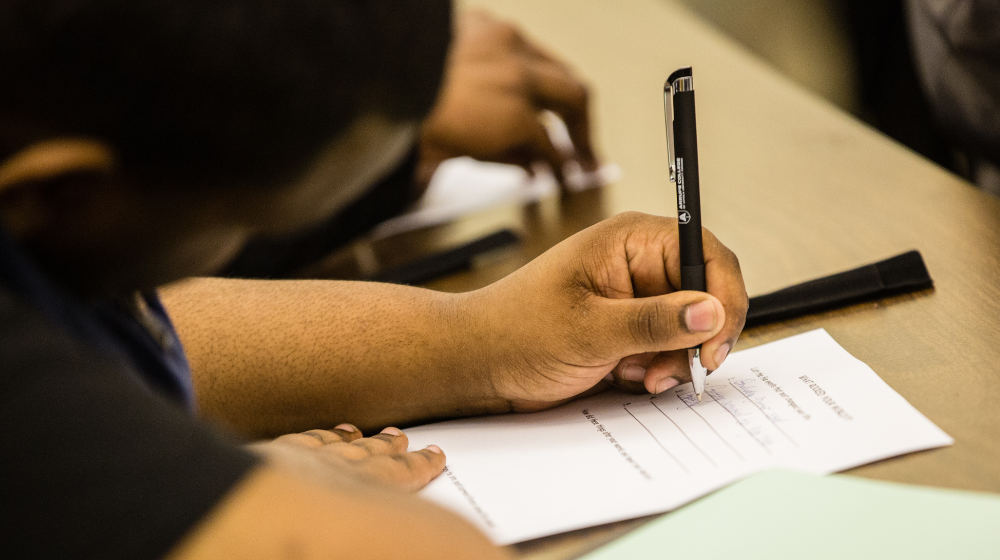
Johnnie's Story
Resisting Oppression in Education
CHICAGO NATIVE JOHNNIE CAMPBELL IS GIVING A VOICE TO MARGINALIZED GROUPS
Johnnie Campbell is a PhD student in Loyola University Chicago's Higher Education Program with an emphasis in Education Policy Studies. He is a Chicago Native from the South Side, and his predominant research interest is the ways Black men resist the forms of oppression that manifest in college environments. In addition to his studies, he founded his own movement, The Resistance Roundtables, LLC, where he centers marginalized and historically minoritized groups to offer new perspectives and provides a platform and voice to these identities.
Here, he talks about his experience and research at Loyola and how his identity has informed it:
What’s your research and work about?
"The goal of my work is to challenge deficit perceptions and rhetoric ideas that surface in education surrounding Black boys and men in education. First off, I'm very interested in understanding how deficit thinking and perspectives are presented in policies and practices within education. Secondly, I'm interested in how Black men elicit and come to know forms of resistance against those deficit ideologies. My passion is to challenge ideas that put Black men in positions where they are seen as less than incapable and that they don't aspire to higher education or degree attainment and to be scholars in academic environments."
What is deficit thinking, and what does it mean to you?
"Deficit thinking was coined by Richard Valencia’s work in 2010-2012. It is this idea of a “less than” notion that's really inflicted upon, let’s say, particularly historically, racially, and ethnically minoritized individuals. The 'less than-ness” is understood to be the fault of the population. This concept fails to address how environmental, sociopolitical, and cultural influences that weigh in on how things come to be."

A Loyola student works diligently in the classroom.
How have your lived experiences informed and impacted your goals as a researcher?
"I identify as a first-generation college student. So to be in a space like this, to talk about myself as a scholar - I don't even think I'm quite used to that yet because my higher education journey, my journey into college was extremely challenging. When you're the first person to do a thing, and you make it there, there's this, for me, inherent tension. I know I'm capable of being here because I got myself here, but also, I don't know what I don't know about this environment because I don't know anyone else in my family or in my circle that has done this successfully to help me think about ways to navigate it. During my undergraduate years, I was Heavily involved in a historically Black fraternity, which led to a lot of exposure to other Black men on campus. They began to seek mentorship from me. I built a community with them, and I learned that some of the challenges that I face in college are unique to my own experiences, but not different in terms of overall themes. Being the only Black person in the class, being in a predominantly white space, and acting as the spokesperson for all Black people.
I specifically choose deficit thinking and resisting forms of oppression because even when we talk about Black men and research, it's laced with deficit thought. We like to ask, ‘What's wrong with Black men?’ As opposed to asking, ‘What's wrong with the structures and the institutions that house them?’ If dreams are supposed to be manifested here in this place we call college, then why is it that black men have to endure these unique challenges to seek out the dreams that they have? Others may not even have to deal with some of these challenges at all. I'm interested in understanding that further.
I'm a proud - and I affectionately use this term - I'm a proud project kid. I'm from the projects on the South side of Chicago, where people don't make it out of high school. But there are bits of knowledge that exist there that taught me how to survive in spaces that were unfamiliar to me. One of these days in life, I'm going to have a son, and I'm going to have a daughter. And when they enter college, I don't want them to feel that strangeness, that unfamiliarity that ‘Do I belong here?’ question that I had to ask when I entered college. And I feel the same for other Black men who do aspire to be scholars, that do aspire to be thinkers."
"I affectionately use this term - I'm a proud project kid." Johnnie Campbell
Which experiences at Loyola have most drastically affected your work, philosophy, or anything of that nature?
"I think that one of the beauties about doctoral studies here in the School of Education is that we are in cohort models, and I’m paired with some very, very brilliant thinkers. If I could, I want to just shout out a couple of folks from my cohort - Alla Tori, then a fourth year, Ali Mohammed, Lisa Daniels, Protege - we’ve developed a very, very tight-knit circle as a cohort, and when we work together, research together, we get this steady dose of support and challenge, and that has been the best developmental privilege I’ve had as a doctoral student. I’ve become a better writer and thinker; I’ve become better in the ways I critique scholarship and in the ways that I understand where I fit in. My own scholarship has, in a large part, been to the community that I’ve gathered with that cohort, and I can’t not thank my faculty for forming us. It’s because of them that we’ve come together. So I do want to pay homage to them - Dr. Dmitri Morgan, whose research team I’m working on now. He is probably one of my favorite thinkers, based on the ways he challenges me and the rest of our faculty too. But it’s the cohort for me. They’ve really been everything."
Story by Lucy Harmon
Johnnie Campbell is a PhD student in Loyola University Chicago's Higher Education Program with an emphasis in Education Policy Studies. He is a Chicago Native from the South Side, and his predominant research interest is the ways Black men resist the forms of oppression that manifest in college environments. In addition to his studies, he founded his own movement, The Resistance Roundtables, LLC, where he centers marginalized and historically minoritized groups to offer new perspectives and provides a platform and voice to these identities.
Here, he talks about his experience and research at Loyola and how his identity has informed it:
What’s your research and work about?
"The goal of my work is to challenge deficit perceptions and rhetoric ideas that surface in education surrounding Black boys and men in education. First off, I'm very interested in understanding how deficit thinking and perspectives are presented in policies and practices within education. Secondly, I'm interested in how Black men elicit and come to know forms of resistance against those deficit ideologies. My passion is to challenge ideas that put Black men in positions where they are seen as less than incapable and that they don't aspire to higher education or degree attainment and to be scholars in academic environments."
What is deficit thinking, and what does it mean to you?
"Deficit thinking was coined by Richard Valencia’s work in 2010-2012. It is this idea of a “less than” notion that's really inflicted upon, let’s say, particularly historically, racially, and ethnically minoritized individuals. The 'less than-ness” is understood to be the fault of the population. This concept fails to address how environmental, sociopolitical, and cultural influences that weigh in on how things come to be."
How have your lived experiences informed and impacted your goals as a researcher?
"I identify as a first-generation college student. So to be in a space like this, to talk about myself as a scholar - I don't even think I'm quite used to that yet because my higher education journey, my journey into college was extremely challenging. When you're the first person to do a thing, and you make it there, there's this, for me, inherent tension. I know I'm capable of being here because I got myself here, but also, I don't know what I don't know about this environment because I don't know anyone else in my family or in my circle that has done this successfully to help me think about ways to navigate it. During my undergraduate years, I was Heavily involved in a historically Black fraternity, which led to a lot of exposure to other Black men on campus. They began to seek mentorship from me. I built a community with them, and I learned that some of the challenges that I face in college are unique to my own experiences, but not different in terms of overall themes. Being the only Black person in the class, being in a predominantly white space, and acting as the spokesperson for all Black people.
I specifically choose deficit thinking and resisting forms of oppression because even when we talk about Black men and research, it's laced with deficit thought. We like to ask, ‘What's wrong with Black men?’ As opposed to asking, ‘What's wrong with the structures and the institutions that house them?’ If dreams are supposed to be manifested here in this place we call college, then why is it that black men have to endure these unique challenges to seek out the dreams that they have? Others may not even have to deal with some of these challenges at all. I'm interested in understanding that further.
I'm a proud - and I affectionately use this term - I'm a proud project kid. I'm from the projects on the South side of Chicago, where people don't make it out of high school. But there are bits of knowledge that exist there that taught me how to survive in spaces that were unfamiliar to me. One of these days in life, I'm going to have a son, and I'm going to have a daughter. And when they enter college, I don't want them to feel that strangeness, that unfamiliarity that ‘Do I belong here?’ question that I had to ask when I entered college. And I feel the same for other Black men who do aspire to be scholars, that do aspire to be thinkers."
Which experiences at Loyola have most drastically affected your work, philosophy, or anything of that nature?
"I think that one of the beauties about doctoral studies here in the School of Education is that we are in cohort models, and I’m paired with some very, very brilliant thinkers. If I could, I want to just shout out a couple of folks from my cohort - Alla Tori, then a fourth year, Ali Mohammed, Lisa Daniels, Protege - we’ve developed a very, very tight-knit circle as a cohort, and when we work together, research together, we get this steady dose of support and challenge, and that has been the best developmental privilege I’ve had as a doctoral student. I’ve become a better writer and thinker; I’ve become better in the ways I critique scholarship and in the ways that I understand where I fit in. My own scholarship has, in a large part, been to the community that I’ve gathered with that cohort, and I can’t not thank my faculty for forming us. It’s because of them that we’ve come together. So I do want to pay homage to them - Dr. Dmitri Morgan, whose research team I’m working on now. He is probably one of my favorite thinkers, based on the ways he challenges me and the rest of our faculty too. But it’s the cohort for me. They’ve really been everything."
